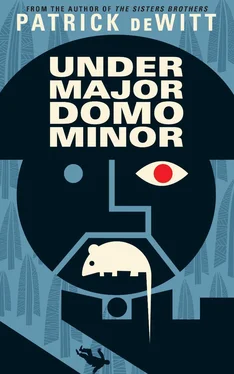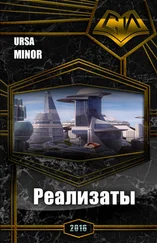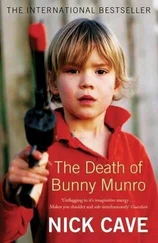Father Raymond thought awhile. A troubled look came over him and Lucy asked if something was the matter. Said the priest, “Not to besmear your quest, boy, but I find myself curious as to why you’re forced to chase after the lass. That is, why is she not stationary? In other words: does this young lady not love you also?”
“Oh, yes, she does. She’s only run off because she believes me dead.”
“Dead!” said Father Raymond, and he slapped his knee. “That’s a good one.”
“Yes.”
“I suppose it is you’ll show her otherwise, eh?”
“I hope to, Father. If I can locate her, that is.”
“Surely you will.”
They spoke through the morning, and both were happy to be reunited. Father Raymond deduced Lucy was penniless and so slipped him some coins, that he might not go hungry. When the train pulled into the station at Bury, Lucy looked out at the town. All was as it had been, but he was not comforted by the familiar sights, and there was no part of him that wished to detrain.
He noticed a beggar kneeling on the platform. The man’s head was bowed, his hands held out before him. A body passed and dropped a coin into the man’s palms; when he peered up to judge the coin’s value, Lucy saw that this person was the man in burlap, a realization which prompted him to gasp.
“What is it?” asked Father Raymond, working to free his satchel from the overhead.
“The beggar on the platform. He’s the same man who came to me when I was so ill. Do you recall it?”
“What, the marauder you told me about?” Father Raymond studied the beggar, then shook his head. “You’re mistaken, boy. That’s only Frederick.”
“You know him?”
“So much as one can know a simpleton. Frederick sweeps out the refectory once in a while for a scrap of bread or sip of wine. He was knocked on his head when he was a child, they say, and he’s been that way ever since. You may take my word for it, he possesses no powers, supernatural or otherwise.”
Lucy stared. “I’m certain it’s the same man,” he said.
“More than likely you half-noticed him about before you took ill, then simply imagined his visit. You were delirious from fever, after all. I saw it myself, remember.”
The conductor was calling for all Bury passengers to disembark. Father Raymond told Lucy, “I do wish you’d stay awhile. You’re certain I can’t persuade you?”
“I’m sorry, Father, but no.”
“Love is so urgent as all that, eh?”
“It is.”
“Perhaps I’m better off without it, then. I never did like to rush. Well, I’m pleased to have seen you, Lucy. Take care of yourself, won’t you?”
“I’ll do that,” Lucy said.
Father Raymond left, and Lucy resumed his study of the man in burlap, who now was sitting back, stacking and counting all that he’d gathered. This was the person indirectly responsible for Lucy’s departure from Bury, and all that had happened to him since. When a string of drool slipped from the man’s lip, he hurriedly sucked it back up into his mouth, as though it were precious to him, and he didn’t dare lose it. The train lurched, and eased free of the station, and Lucy was again in motion.
He had never been west of Bury, and he watched the flatland scenery unfold with an active interest. Here there were no trees, no mountains, only pastures of level green, and it was so very quiet and peaceful for Lucy in the padded, red-velvet compartment. He imagined how it would be when he located Klara, and composed scenarios of surprising her on the seashore, and now in the lobby of a grand coastal hotel. These exercises pleased and excited him profoundly, but in time he grew tired and set them aside. He closed his window shade and sat awhile in the partial darkness. The conductor passed in the corridor and Lucy called after him, asking to borrow paper and pencil. Using his valise as a drafting board, then, he drew an upside-down “U” shape. Under the dome of this line he wrote some words for the future, the faraway future he hoped. But whether they were needed sooner or later, he knew it was good to get them down:
LUCIEN MINOR
His heart was a church of his own choosing,
and the lights came through
the colourful windows.
Philippe, Emma, and Nina Aronson, D. Contumely Berman, Leslie Butler, Rachel Lee Corry (herself a beguiler), Eric Issacson, Azazel Jacobs, Megan Lynch and Dan Halpern and everyone at Ecco, Lee Boudreaux, Peter McGuigan and everyone at Foundry, Sarah MacLachlan and Janie Yoon and everyone at House of Anansi, Leslie Napoles (all grace), Rene Navarette, Brian Mumford, Danny Palmerlee, Max Porter and Aidan O’Neill and everyone at Granta, Steve Schiller, Scoop Short, Dan Stiles, Libby Werbel, my mother, father, and brothers.
In writing this book I considered the works of Thomas Bernhard, Ivy Compton Burnett, Italo Calvino, Dennis Cooper, Robert Coover, Roald Dahl, J.P. Donleavy, C.F., Knut Hamsun, Sammy Harkham, Werner Herzog, Bohumil Hrabal, Shirley Jackson, Pär Lagerkvist, Harry Mathews, Steven Millhauser, Jean Rhys, Robert Walser, and Eudora Welty. My thanks to them.












